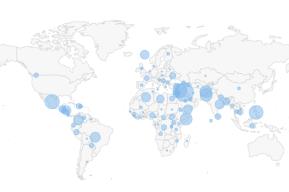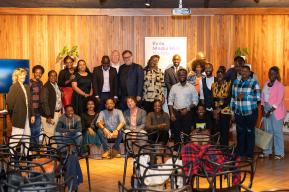News
UNESCO and media freedom organizations call for continued support to Afghan media and journalists

The aim was to discuss the continued and emerging needs of the Afghan media community and to support their resilience and medium-term viability.
The discussion was informed by testimonies in a live connection with the UNESCO Office in Kabul which hosted the partners and beneficiaries of the project “Support to Afghan Media Resilience to Foster Peace and Security”, funded by the European Union. The partners, including journalists’ unions, major and local media organizations and specialized NGOs, presented results of their work on ensuring access to lifesaving, educational and humanitarian information and promoting the safety of journalists.
The meeting in Brussels, brought together the civil society organizations working to support the struggling Afghan media sector and promote the safety of journalists who were joined by Tomas Niklasson, European Union Special Envoy for Afghanistan as well as UNESCO staff working on Afghanistan. Representatives of the Committee to Protect Journalists (CPJ), Global Forum for Media Development (GFMD), International Federation of Journalists (IFJ), International Media Support (IMS), Internews, Media in Cooperation and Transition (MiCT) and Reporters Without Borders (RSF) exchanged information on their actions in the country and identified persisting and emerging needs.
A joint call to action
The international media support organizations and participants, called for continued and upscaled international support based on their extensive experience operating in the country. They recalled the appeal collected by RSF on 16 September 2021, as well as the conclusion of the statement prepared by more than 30 Afghan journalists and media managers that convened in Brussels earlier this year, on 15 March, to mark the National Day of Journalists in Afghanistan. Jointly the participants identified the following priorities:
Advocacy by international organizations to promote freedom of expression in Afghanistan and support the safety of journalists: Two years after the takeover by the Taliban, the situation for journalists continues to be dangerous, with many in hiding, seeking shelter, or subject to increasing arrests. Continued efforts are therefore needed to promote a safer environment for journalists in the country, including through advocacy, monitoring and training on psychological, physical and digital safety, especially for women journalists. In addition, media in exile, including individual journalists who are in precarious situations and in danger of repatriation require urgent international support, including through emergency visa, relocation and financial assistance.
Support to the resilience of the vibrant and professional Afghan media community, including the independence and diversity of the media inside and outside the country (“hybrid” and diaspora media): Participants called on all stakeholders to ensure that media can operate independently and safely and stressed the importance of a flexible, long term, hybrid approach, with particular focus to women journalists and taking all steps necessary to ensure they can continue to exercise their profession without restrictions.
Humanitarian information: Access to verified humanitarian information plays a critical role in fostering aid efficiency, avoiding an information vacuum, contributing to provincial and local community engagement and meeting the basic human needs of communities across the provinces. Recent projects have shown how reporting on local issues can lead to alleviating the dire conditions of the Afghan population. Support to independent journalism and public interest content must continue to go hand in hand with the provision of humanitarian aid and development support.
Mobilization of media in support of emergency alternative education: Since 23 March 2022, 1.1 million girls have been prevented from attending secondary school until further notice. Since 20 December 2022, the Taliban have banned women from universities, denying access to higher education to more than 100,000 young women. While continuing to call for the re-opening of schools and universities to all girls and women, the participants noted that alternative emergency learning is essential in ensuring continued access to education and Afghan media have started innovative initiatives in this regard. Leveraging the media to expand radio and video-based distance learning is therefore an essential response that must be upscaled.
Support to women journalists: More than 90% of Afghan women journalists, many of which were the sole breadwinners in their families, have lost their jobs. The fundamental rights to education and to freedom of expression, enshrined in the Universal Declaration for Human Rights are at stake. Media is now one of the few places where women can still work in presence, though with restrictions, following the December 2022 ban on women’s employment in NGOs and international organizations. Access to employment, engagement in leadership positions, financial support and training opportunities to the many women must be a priority for any media support programme.
Cooperation among Afghan media: Building on the joint statement issued by Afghan journalists operating from inside and outside of the country in March 2023, the participants emphasized the continued need to foster collaboration to preserve collective advocacy and unity within the Afghan media sector in order to promote press freedom. While UNESCO and media support organizations have assisted in taking steps towards reinforcing trust among Afghan media organizations, this process must be sustained, locally led and strengthened.
Collaboration amongst international media support organizations: The participants agreed on the need and joint commitment to further foster close cooperation, coordination and collaboration in support of Afghan media.
Find out more about UNESCO’s work on the safety of journalists.





